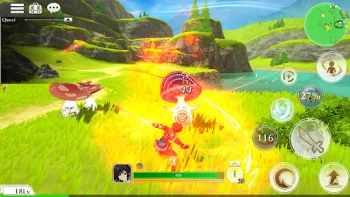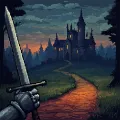Apps Home

Immersive World Exploration and Storytelling
The allure of METRIA the Starlight lies in its compelling world exploration and rich storytelling set in the vibrant fantasy landscape of the "Continent of Ronatis". The continent is a diverse tapestry of nine distinct countries, each with their own cultures, traditions, and histories, creating a dynamic backdrop for the epic adventures that unfold. Players step into the shoes of a variety of unique characters, such as the apprentice knight Rio Calquinos, whose journey provides perspective into knightly orders and chivalry within the game’s universe. Meanwhile, characters like Aru, a demi-human girl, offer narratives that delve into the world’s intricate race relations and societal norms. Throughout this expansive realm, players are confronted with formidable enemies and complex puzzles that guard the world's deepest secrets. The game does not merely unfold a story; it invites players to live within it through environmental storytelling, direct character interactions, and immersive voice lines. The attention to detail in the environmental design allows players to discover hidden stories told through ancient ruins, libraries packed with lore, and non-playable characters whose lives tell tales of past wars and peacetimes. Straying from the beaten path often rewards players with side quests that enhance understanding of the main storyline and provide opportunities for character development. This deliberate design choice encourages players to explore every nook and cranny of Ronatis, making each expedition a new story worth telling.
Engaging Battles and Comprehensive Combat System
The combat system in METRIA the Starlight is a thrilling combination of strategy and real-time action that ensures every battle is as engaging as the last. Players navigate battles with a team of three characters, carefully selecting members who complement each other’s abilities. The real-time action battles require players to think on their feet, employing a mix of rapid dodges, calculated jumps, and skillful attacks to outmaneuver opponents. Each character in the player’s team is equipped with unique skills and special moves that come alive with flashy animations, adding a layer of strategic depth as players must decide the optimal time to unleash these powerful abilities. For instance, Rio Calquinos might use a shield bash to break an enemy’s guard, while Aru could capitalize on the opening with a swift barrage of attacks. The fluidity of combat is augmented by the game's stunning 3D graphics that make every skirmish a visual spectacle, from vivid spell effects that illuminate the battlefield to dynamic physics that give weight to every sword swing and arrow shot. The game’s AI opponents are no pushovers either, with sophisticated behaviors and tactics that challenge players to adapt and refine their combat strategies continually. This emphasis on strategy is further enhanced by a crafting system that allows players to create and enhance weaponry and armor using materials gathered during their adventures, presenting another facet of depth in how players approach battles. Thus, the combat system is not only a test of reflexes but also a playground for tactical experimentation and mastery.
Crafting, Gathering, and Resource Management
In METRIA, crafting and gathering are more than side activities; they are integral parts of the journey that enrich gameplay and character progression. Players are encouraged to dive into a variety of activities such as felling trees, mining ores, fishing, and plant gathering, which serve not only as relaxing interludes from the heat of battle but also as essential methods of obtaining necessary resources. These materials are crucial for crafting items and equipment that can significantly enhance the player's abilities and survivability in combat. The crafting system is deep and rewarding, offering a plethora of options that allow for personalization of weapons and gear to suit different styles of play. Players might craft a lightweight armor set to enhance agility for a rogue-like approach or a heavy, fortified one for tanking damage in frontline combat. Additionally, the game's economy is interwoven with these systems, as players can trade excess resources or crafted goods with in-game merchants or other players, fostering local economies within the game world. Resource management, therefore, becomes a strategic element, where players must decide how best to allocate their efforts—whether to improve their combat capabilities or to focus on gathering wealth and resources. This multifaceted approach to crafting and gathering encourages players to engage with the game's world in creative and strategic ways, making every choice matter.
Multiplayer and Community Interaction
At its heart, METRIA the Starlight is not just an adventure for solo players but a shared journey that thrives on community interaction and multiplayer gameplay. The game’s design emphasizes cooperative online modes where players can join forces to take on challenging dungeons, engage in strategic PvP battles, or simply explore the vast continent of Ronatis with friends. These interactions provide a rich social dimension to the game, where players can form guilds, coordinate strategies, and tackle challenges that would be insurmountable alone. The guild system acts as a platform for players to share resources, plan large-scale adventures, and foster camaraderie, strengthening the communal aspect of the game. Communication tools integrated into the game allow players to express themselves and interact seamlessly through text and voice chat, making coordination and socialization intuitive and engaging. Multiplayer events and seasonal challenges bring the community together, offering limited-time rewards that encourage players to participate actively. The developers also maintain an active presence in the community through social media platforms like X, where they share updates and engage with player feedback, ensuring that the game evolves in harmony with the community’s desires. This vibrant community backdrop enhances METRIA’s world, making every adventure one of shared triumphs and collaborative storytelling.
Technical Requirements and Platforms
METRIA the Starlight is a visually demanding game, designed to make the most of modern hardware to deliver its stunning graphics and seamless gameplay. For Android users, the game requires an OS of version 12 or higher and at least 4GB of RAM to ensure smooth operation and responsiveness during both exploration and combat. The recommended requirements also suggest a stable Wi-Fi connection, particularly for downloading and playing, due to the extensive data volume of the game’s content. The game’s developers have optimized METRIA to take advantage of the latest mobile technologies, ensuring it runs effectively on newer devices while still maintaining a manageable file size. Currently, it is accessible on Android platforms, offering a comprehensive and mobile-friendly experience that caters to players on the go. Although specific download options for iPhone, Windows, Linux, and Mac are not yet available, the anticipated expansion to these platforms suggests a commitment to broadening the game’s accessibility. Download for Android invites new players to step into the fantastical realm of Ronatis. As the game continues to grow, future platform expansions will undoubtedly bring METRIA’s epic adventures to an even wider audience, ensuring that the call to adventure can be answered by many more adventurers eager to uncover the truths of this magical world.
Share Your Opinion
Your Email Will Not Be Published.
All Rights Reserved © Apps Home 2025








































Justin Borthick
There are a lot of load screens, fully instanced, no world spread, and that's the only problem I have with it, which isn't enough of a problem to m...
Jackie Wallace
I've played quite a bit of the game now. and I highly recommend it. The characters designs are all really neat, and the gameplay is unique between ...
Summer LaRose
The gameplay is awesome, but the draw rates are just killing me. I'm so sick of drawing and not getting high tier pulls, all this wasted money. If ...
Samuel C
It is a weird mix between genshin and something older but not really like toram at all except maybe aesthetic, this isnt a genre really my style i ...
Amber
it's a great game so far. not too easy but not too hard combat, although on my freeyond m5a Android is super laggy which makes gameplay much harder...